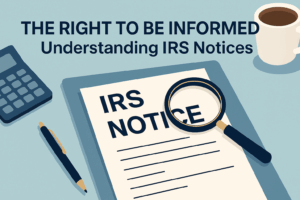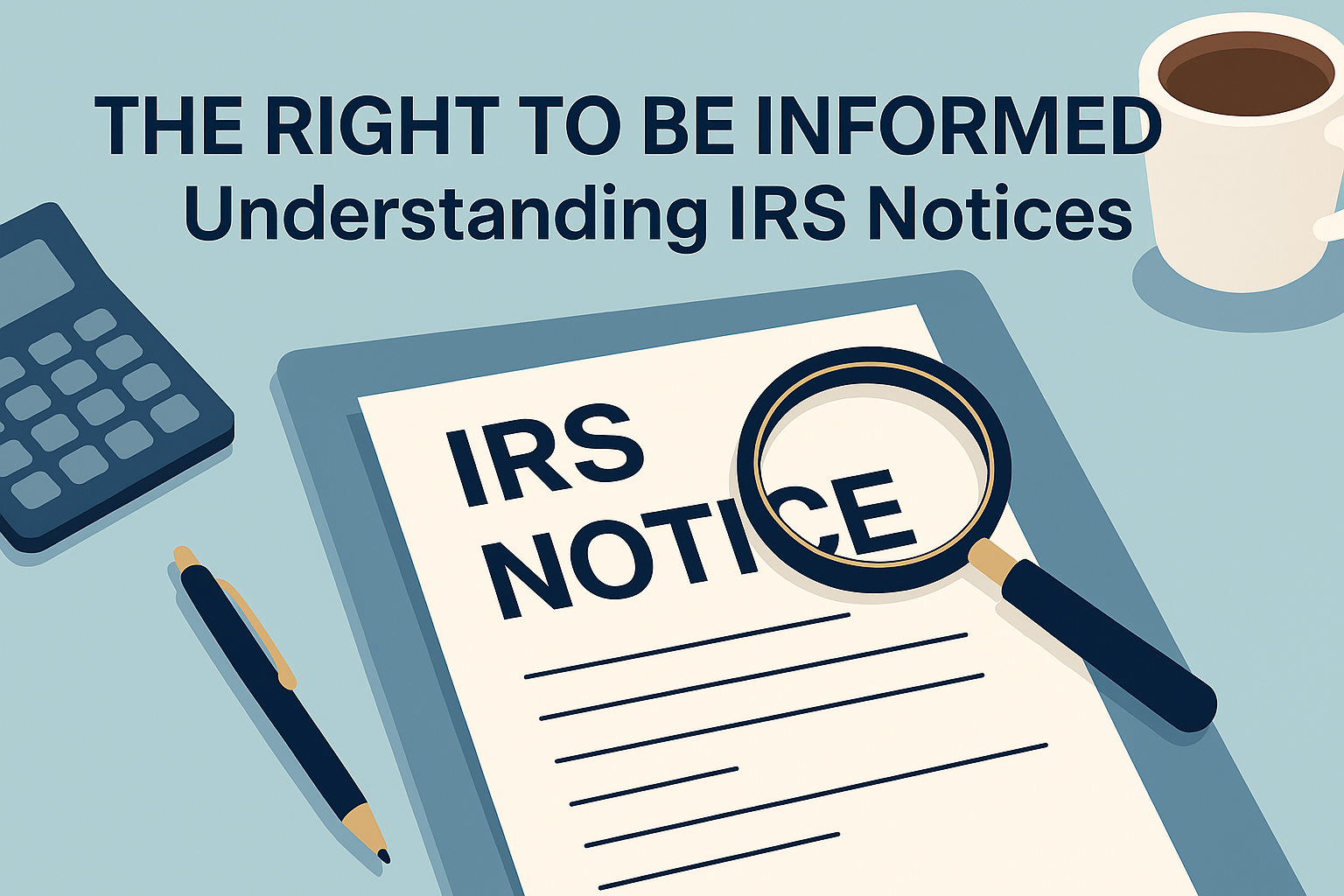
Flat-style illustration of an IRS notice with a magnifying glass and pen, symbolizing understanding IRS communication.
Know Your Taxpayer Rights: The Right to Be Informed
When most people get an IRS notice in the mail, the first reaction is panic — and I get it. Consequently, when I see notices that come to my office even if on behalf a client, I also get jumpy. The envelope alone can spike your blood pressure. Nevertheless, before you jump to the worst conclusions, remember this: you have the right to be informed.
Ultimately, that means the IRS is required to clearly explain why they’re contacting you, what they need, and what your rights are. You’re not supposed to be left guessing or intimidated by government language. In fact, the IRS recently started designing and rewriting notices so they are in even more plainer language than ever before. Unfortunately, a lot of taxpayers don’t realize how far this right to be informed goes — or how often it’s overlooked.
Know What “Being Informed” Really Means
Under the IRS Taxpayer Bill of Rights, you have the right to:
-
Understand the reason for every notice or letter the IRS sends.
-
Receive a clear explanation of taxes owed, adjustments, or penalties.
-
Know how to challenge or appeal an IRS decision.
-
Be told what you need to do next and the deadline to respond.
In other words: no hidden fine print, no surprises.
Understandably, the IRS is required to make its communications understandable to the average taxpayer — not just to tax professionals. Therefore, if a letter or notice doesn’t make sense, you’re not at fault for being confused.
Know About a Real Example from My Desk
Recently, Claudia (one of my clients) came to me with a notice that said her refund was “recalculated due to a discrepancy.” That’s IRS language for “we changed something — but we’re not telling you what.”
Subsequently, after reviewing it together, we discovered that the IRS had incorrectly adjusted her earned income credit. One phone call and a written response later, the issue was corrected — but imagine if she had just ignored that notice out of confusion or fear.
That’s why this right matters so much because when you don’t understand what the IRS is saying, you could lose money or legal footing simply by not responding.
Know What to Do If You Don’t Understand a Notice
- Don’t panic — and don’t ignore it. Every IRS notice has a purpose and a timeline.
- Keep the envelope and all pages. The letter code (like CP2000 or LT11) tells us exactly what type of issue it is.
- Call or consult a professional early. Sometimes a 10-minute review can save you hours of stress — and hundreds in penalties.
Know Your Next Step
If you’ve received an IRS notice and aren’t sure what it means, don’t guess — get clarity.
At W. Scully, CPA, P.C. and Tax Resolution Experts of America, we help taxpayers interpret IRS letters, respond correctly, and avoid unnecessary interest and penalties.
👉 Click to book a confidential consultation today;
👉 Or call us directly at (718) 938-4601 or visit W. Scully, CPA, P.C.
Want more blog content? Find more here
Connect with me, everywhere:
Fill out the form below to connect with us now:
[contact-form][contact-field label=”Name” type=”name” required=”true” /][contact-field label=”Email” type=”email” required=”true” /][contact-field label=”Website” type=”url” /][contact-field label=”Message” type=”textarea” /][/contact-form]

